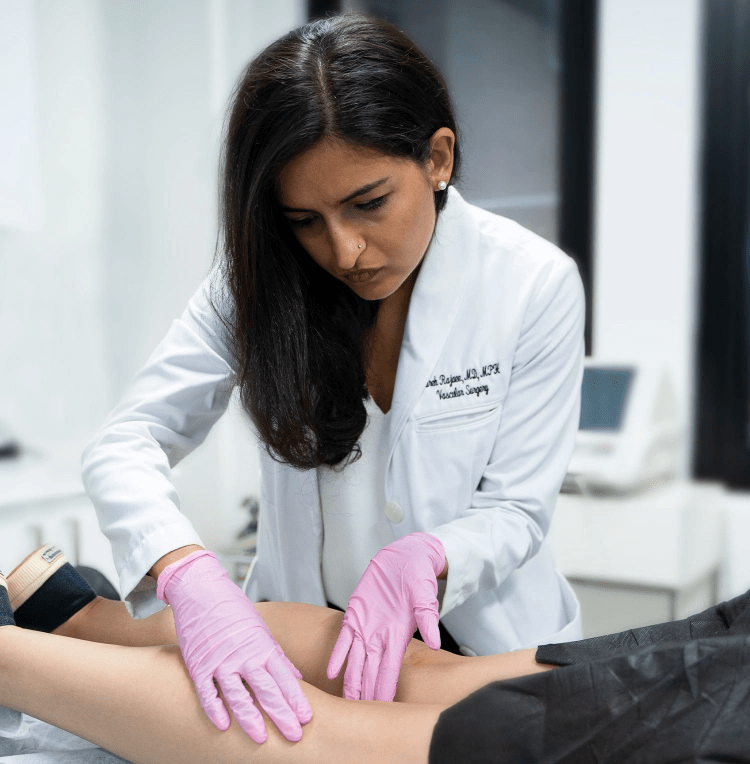What Type Of Doctor Treats Varicose Veins? Exploring Treatment Options And Specialists
Introduction: Unraveling The Mystery Of Varicose Veins Treatment
What type of doctor treats varicose veins?, Varicose veins can be a source of discomfort and concern for many individuals. Understanding the right type of doctor to consult is crucial for effective treatment. In this comprehensive guide, we’ll delve into the world of varicose veins, exploring treatment options and identifying the specialists best equipped to address this common vascular issue.
Advantages Of Seeking Professional Treatment
Varicose veins are not just a cosmetic concern; they can lead to various health issues if left untreated. Seeking professional treatment offers several advantages:
Early Detection and Prevention
Consulting a specialist early on allows for the detection of varicose veins in their initial stages. Early intervention can prevent the progression of the condition and alleviate symptoms before they become severe.
Customized Treatment Plans
Specialized doctors can tailor treatment plans to individual needs. Whether through minimally invasive procedures or lifestyle recommendations, a personalized approach enhances the effectiveness of treatment.
Improved Quality of Life
Effective treatment not only addresses the physical aspects of varicose veins but also improves overall well-being. Patients often experience increased energy levels and a reduction in pain and discomfort, leading to an enhanced quality of life.
Understanding The Varicose Veins Phenomenon
Before exploring the types of doctors who treat varicose veins, it’s essential to understand the phenomenon itself.
What Are Varicose Veins?
Varicose veins are enlarged, twisted veins that usually appear on the legs. They result from weakened or damaged valves in the veins, causing blood to pool and the veins to become swollen and visibly distorted.
Causes and Risk Factors
Several factors contribute to the development of varicose veins, including genetics, age, gender, and lifestyle choices. Understanding these factors is crucial for effective treatment and prevention.
Types Of Doctors Specializing In Varicose Veins
Identifying the right type of doctor for varicose vein treatment is paramount. Here are some specialists who play a key role in managing this condition:
Vascular Surgeons
Vascular surgeons specialize in treating disorders of the vascular system, including varicose veins. They are trained to perform surgical procedures when necessary and may also offer minimally invasive treatments such as endovenous laser therapy (EVLT) or radiofrequency ablation (RFA).
Interventional Radiologists
These specialists use imaging techniques, such as ultrasound, to guide minimally invasive procedures for treating varicose veins. Interventional radiologists often perform procedures like sclerotherapy, where a solution is injected into the veins to close them.
Phlebologists
Phlebologists are doctors who focus specifically on vein diseases. They are well-versed in the latest diagnostic and treatment methods for varicose veins and other venous disorders.
4. The Role Of Dermatologists In Varicose Vein Treatment
Dermatologists, known for their expertise in skin-related issues, also play a role in varicose vein treatment.
Cosmetic Concerns
While dermatologists may not perform surgical interventions, they can address the cosmetic aspects of varicose veins. Cosmetic treatments such as laser therapy or injections may be offered to improve the appearance of the affected areas.
Collaborative Care
Dermatologists often collaborate with vascular surgeons and other specialists to provide comprehensive care. Their focus on skin health complements the overall treatment approach for varicose veins.
5. General Practitioners And Initial Consultations
When individuals notice symptoms of varicose veins, their first point of contact is often a general practitioner (GP).
Initial Assessment
GPs can conduct an initial assessment and refer patients to specialists if necessary. They play a crucial role in coordinating care and ensuring that individuals receive the appropriate treatment for their condition.
Lifestyle Recommendations
General practitioners may also provide lifestyle recommendations to manage varicose veins, including exercise, compression stockings, and dietary changes. These interventions can be beneficial in the early stages of the condition.
6. The Importance Of Collaboration Among Specialists
In many cases, a collaborative approach involving different specialists ensures comprehensive and effective care for varicose veins.
Multidisciplinary Teams
Combining the expertise of vascular surgeons, interventional radiologists, phlebologists, and dermatologists can lead to a more holistic treatment approach. This collaborative effort addresses both the medical and cosmetic aspects of varicose veins.
Patient-Centric Care
Collaboration among specialists promotes patient-centric care, where treatment plans are tailored to the unique needs and preferences of individuals. This approach increases the likelihood of successful outcomes and patient satisfaction.
Conclusion: Navigating The Path To Varicose Vein Treatment
In the quest for effective varicose vein treatment, understanding the advantages of seeking professional care and identifying the right specialists are crucial steps. Whether consulting a vascular surgeon, interventional radiologist, phlebologist, dermatologist, or a general practitioner, the key is early detection and personalized treatment plans. By embracing a collaborative approach, individuals can navigate the path to varicose vein treatment with confidence, improving not only their vascular health but also their overall well-being.



